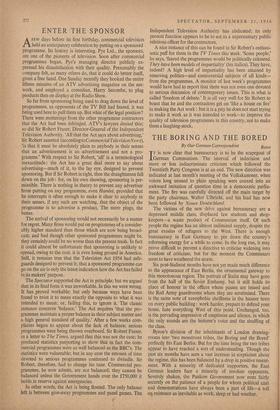THE BORING AND THE BORED
By Our German Correspondent Bonn
IT is now clear that bureaucracy is to be the scapegoat of German Communism. The interval of indecision and more or less indiscriminate criticism which followed the Twentieth Party Congress is at an end. The new direction was indicated at last month's meeting of the Volkskammer, when voices long unused to plain speaking were coaxed into an awkward imitation of question time in a democratic parlia- ment. The fire was carefully directed off the main target by the party chairman, Walter Ulbricht, and his lead has now been followed by Neues Deutschland.
The victims of the new drive against bureaucracy are a depressed middle class, displaced law students and shop- keepers—a waste product of Communism itself. Of such people the regime has an almost unlimited supply, despite the great exodus of refugees to the West. There is enough bureaucracy in East Germany to pin down the country's reforming energy for a while to come. In the long run, it may prove difficult to prevent a directive to criticise widening into freedom of criticism; but for the moment the Commissars seem to have weathered the storm.
Six post-Stalinist months have not yet made much difference to the appearance of East Berlin, the ornamental gateway to this monotonous region. The portrait of Stalin may have gone from the hall of the Soviet Embassy, but it still holds its place of honour in the offices where passes are issued and the Red Army guardrooms where they are scrutinised. There is the same note of xenophobic shrillness in the banner texts on every public building : work harder, prepare to defend your home, hate everything West of this point. Unchanged, too, is the pervading impression of emptiness and silence, in which the only sounds are the lecturer's voice and the shuffling of the class.
Byron's division of the inhabitants of London drawing- rooms into 'two monstrous tribes, the Boring and the Bored' perfectly fits East Berlin. But for the time being the two tribes appear to have reached a sort of understanding. Though the past six months have seen a vast increase in scepticism about the regime, this has been balanced by a drop in positive resent- ment. With a minority of dedicated 'supporters. the East German leaders face a minority of resolute opponents. Severely shaken, the Pankow Government now rests fairly securely on the patience of a people for whom political cant and demonstrations have always been a part of life—a toll oq existence as inevitable as work, sleep or bad weather.


































 Previous page
Previous page